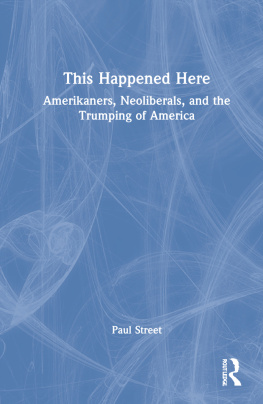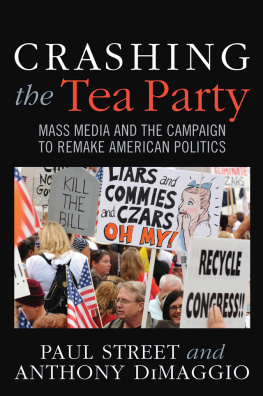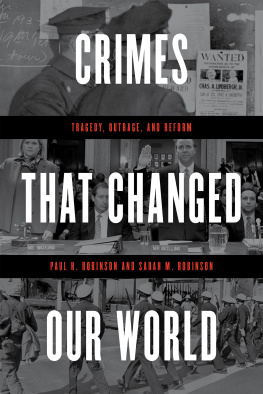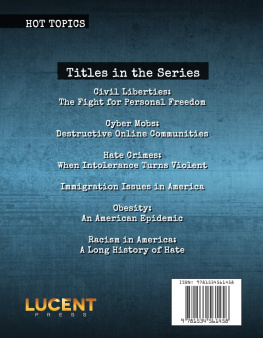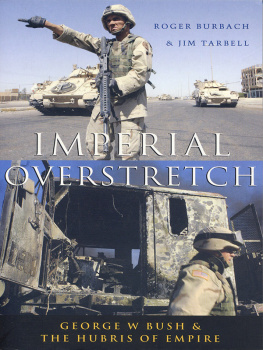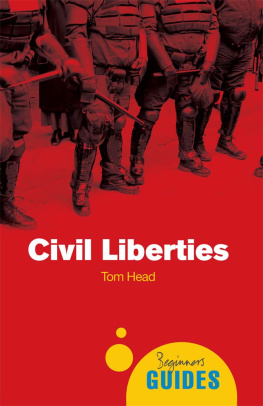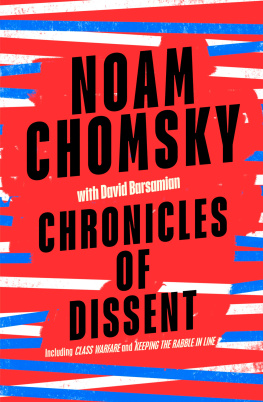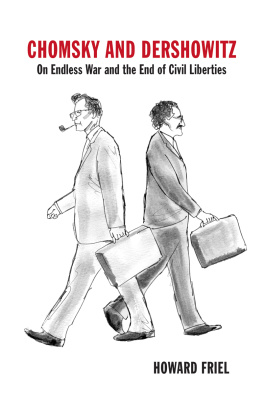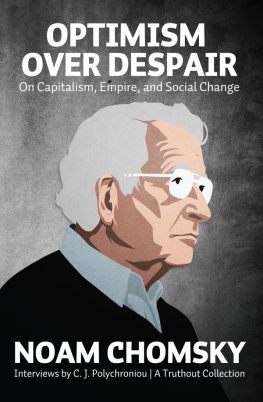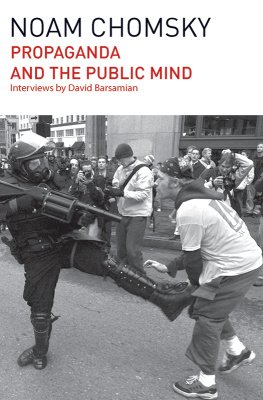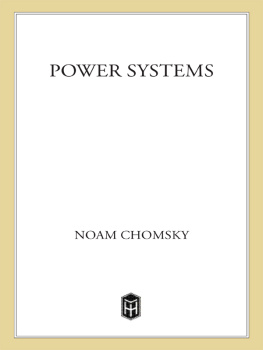Empire and Inequality
Cultural Politics & the Promise of Democracy
Henry A. Giroux, Series Editor
Empire and Inequality: America and the World Since 9/11
by Paul Street
The Terror of Neoliberalism
by Henry A. Giroux
Forthcoming
Reading and Writing for Civic Literacy: The Critical Citizens Guide to Argumentative Rhetoric
by Donald Lazere
Schooling and the Struggle for Public Life, Second Edition
by Henry A. Giroux
Kids in the Crossfire
by Lawrence Grossberg
Reading French Feminism
by Michael Payne
Listening Beyond the Echoes: Agency and Ethics in a Mediated World
by Nick Couldry
First published 2004 by Paradigm Publishers
Published 2016 by Routledge
2 Park Square, Milton Park, Abingdon, Oxon OX14 4RN
711 Third Avenue, New York, NY 10017, USA
Routledge is an imprint of the Taylor & Francis Group, an informa business
Copyright 2004 by Paul Street
All rights reserved. No part of this book may be reprinted or reproduced or utilised in any form or by any electronic, mechanical, or other means, now known or hereafter invented, including photocopying and recording, or in any information storage or retrieval system, without permission in writing from the publishers.
Notice:
Product or corporate names may be trademarks or registered trademarks, and are used only for identification and explanation without intent to infringe.
Library of Congress Cataloging-in-Publication Data
has been applied for.
Designed and Typeset by Straight Creek Bookmakers.
ISBN 13: 978-1-59451-058-8 (hbk)
ISBN 13: 978-1-59451-059-5 (pbk)
The left-democratic and antiwar essays collected in this volume find their most immediate origin in the horrific events of September 11, 2001, or, more accurately, in the American power elites response to those events. Within a week of the terrible jetliner attacks, I was invited to speak about their meaning and implications at a teach-in coordinated by a student peace and justice organization at Northern Illinois University. In a talk titled On Waking Up and Losing Our Innocence in the Wake of the September 11th Terror Attacks, I claimed that the terrible events were a great gift to the right wing in this country. Unless checked by a determined citizenry, I argued, the in-power American right, which has been falsely labeled conservative (it seeks to radically exacerbate inequality, repression, and concentration of wealth power at home and abroad), was going to use 9/11 to divert massive public resources from meeting social needs to the expansion of the already overfed and bloated military-industrial complex. In the process, I argued, those in power would roll back civil liberties and advance policies intended to increase the already-grotesque overconcentration of wealth and power in the United States, the industrialized worlds most economically unequal nation. Nine-eleven, I argued, was a great opportunity for concentrated economic and political power to advance intimately related projects of empire and war abroad and inequality and repression at home. In the end, the tragedy would serve to legitimize a dangerous and illegitimate president who was captive to multinational petroleum and military corporations whose policies were largely to blame for the Middle Eastern quagmire that gave rise to 9/11. It is the structurally encoded role of the mainstream corporate media, I added, to discourage Americans from really thinking about these and other things. These media are owned by a small number of gigantic corporations with all kinds of links to those petroleum and defense firms. One of those corporate-media-military giants (Brokaws NBC) is in fact owned by the worlds largest defense contractorGeneral Electric. On the basis less of some sort of conspiracy than of basic authoritarian structural and institutional self-interest, it is the job of our media-military-industrial complex to whip us into a war fever. When war machines move into gear, I concluded, ordinary people die en masse, rich folks get richer, and politicians restrict civil liberties.1
The warnings I offered were not particularly original. Nonetheless, they have proved all-too accurate in the two and one-half years since 9/11. In fact, those warnings have provided essential background for many of the numerous articles and commentaries Ive written since 9/11, a portion of which appear with small editorial changes and new annotations in this volume.2
The essays collected as individual chapters in this book were written between September 11, 2001, and September of 2003. Most of them originally appeared on ZNet, a left site to which I still contribute on a regular basis. They reflect one US citizens horrified reflections on the in-power US right wings determination and ability to use the terrible jetliner attacks of 9/11 as a windfall opportunity to advance intimately interrelated projects of empire and inequality at home and abroad. They were written before a number of significant developments of great relevance to those projects:
The grisly murder in April 2004 of four American mercenaries in Fallujah, Iraq, followed by a significant uprising of Sunni Muslims in Iraq, which caused the death of eighty US Marines and led to a bloody US repression that killed hundreds of Iraqis.
The April 2004 anti-occupation rebellion of Iraqi Shiites, under the banner of the young Shiite cleric Moktada al-Sadr, which combined with the Sunni insurgency to make April 2004 the bloodiest month for US troops since the initial invasion of Iraq.
The monumental scandal that emerged in May 2004 over US abuse and torture of Iraqi prisoners in Abu Ghraib and other US detention facilities in Iraq.
The removal in February 2004 of Haitis democratically elected President Jean Baptiste Aristide, flown to Africa in a US military plane and replaced by brutal and authoritarian forces considered more sympathetic to US interests.
The December 2003 U.S. capture and subsequent public disappearance of former US client Saddam Hussein.
The Islamic-terrorist train bombing in Madrid, Spain in March 2004 followed by the electoral defeat of Spains Prime Minister Jos Maria Anzar and the decision of his Socialist successor to remove Spanish troops from occupied Iraq.
The mainstream US medias general acknowledgment that the Bush administration made false claims about Saddam Husseins possession of weapons of mass destruction (WMD).
The emergence in March 2004 of former Bush II counterterrorism czar Richard A. Clarke as a leading critic of the Bush administrations decision to give priority to the imperial war on Iraq over the protection of Americans from al-Qaeda and other extremist Islamic terror networks.
The publication in March 2004 of Clarkes stinging anti-Bush expos Against All Enemies and the publication in April 2004 of Bob Woodwards Plan of Attack, both of which detailed key aspects of Bushs leap from the war on al Qaeda to the war on Iraq.
The publication of of CIA analyst Anonymous heretical Imperial Hubris: Why the West is Losing the War on Terror (Washington, DC, 0204), which argued that al Quaeda and others Islamist terror networks attack Americans and the US for what we [Americans and the US] do in the Middle East (project empire by Anonymous account rather than for what we are and what we think. The emergence of open acknowledgment within the United States that the occupation of Iraq had turned into a fiasco, significantly analogous to Vietnam.


